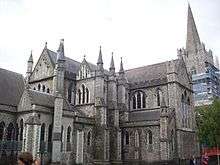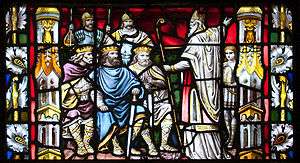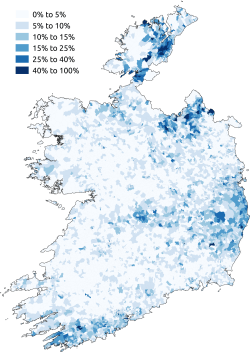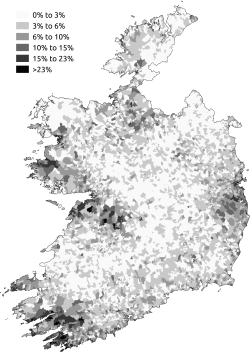Religion in the Republic of Ireland
The predominant religion in the Republic of Ireland is Christianity, with the largest church being the Catholic Church. The Constitution of Ireland says that the state may not endorse any particular religion and guarantees freedom of religion.
Religions in the Republic of Ireland (2016)[1]
In the 2016 census, 78.3% (3.7 million) of the population identified as Catholic which is 132,220 fewer than 5 years earlier in 2011 when the percentage stood at 84%.[2]
The next largest group after Catholic was "no religion". 10% of the population (468,421 people) had no religion or did not indicate a religious belief according to the census.[3] This was a 73.6% increase from 2011[4] Researchers debate the relative significance of secularisation as a general feature of Irish society,[5] the interpretation of census results[6] and the extent to which religious syncretism is becoming more widespread.[7]
The second largest Christian denomination, the Church of Ireland (Anglican), declined in membership for most of the twentieth century, but has more recently experienced an increase, as have other small Christian denominations. Other significant Protestant denominations are the Presbyterian Church in Ireland, followed by the Methodist Church in Ireland. The country's Orthodox Christians, Hindus and Muslims populations have experienced significant growth in recent years, due chiefly to immigration, with Orthodox Christianity being the fastest growing religion in Ireland.[8][9]
Politics

Originally, the 1937 Constitution of Ireland gave the Catholic Church a "special position" as the church of the majority, but also recognised other Christian denominations and Judaism. As with other predominantly Catholic European states, the Irish state underwent a period of legal secularisation in the late twentieth century. In 1972, the article of the Constitution naming specific religious groups, including the Catholic Church, was deleted by the fifth amendment of the constitution in a referendum.
Article 44 remains in the Constitution. It begins:
The State acknowledges that the homage of public worship is due to Almighty God. It shall hold His Name in reverence, and shall respect and honour religion.
The article also establishes freedom of religion (for belief, practice, and organisation without undue interference from the state), prohibits endowment of any particular religion, prohibits the state from religious discrimination, and requires the state to treat religious and non-religious schools in a non-prejudicial manner.
Education
Despite a large number of schools in Ireland being run by religious organizations but funded by the state, a general trend of secularism is occurring within the Irish population, particularly in the younger generations.[10] Many efforts have been made by secular groups to eliminate the rigorous study in the second and sixth classes, to prepare for the sacraments of Holy Communion and confirmation in Catholic schools. Parents can ask for their children to be excluded from religious study if they wish. However, religious studies as a subject was introduced into the state administered Junior Certificate in 2001; it is not compulsory and deals with aspects of different religions, not focusing on one particular religion.
Christianity

| Christian denominations in Ireland |
|---|
|
Church of Ireland (Anglican) |
Christianity is the largest religion in the Republic of Ireland based on baptisms. Irish Christianity is dominated by the Catholic Church, and Christianity as a whole accounts for 82.3% of the Irish population. Most churches are organized on an all-Ireland basis which includes both Northern Ireland and the Republic of Ireland.
Irish travellers have traditionally adopted a very particular attitude to the Catholic Church, with a focus on figures such as "healing priests".[11] More generally a tradition of visions continues, often outside of Church sanction.[12]
Evangelical movements have recently spread both within the established churches and outside them.[13] Celtic Christianity has become increasingly popular, again both within and outside established churches.[14]
The patron saints of Ireland for Catholics and Anglicans are Saint Patrick, Saint Brigid and Saint Columba. Saint Patrick is the only one of the three who is commonly recognised as the patron saint. Saint Patrick's Day is celebrated in Ireland and abroad on 17 March.
Eastern Orthodoxy in Ireland is represented mainly by recent immigrants from Eastern European countries, such as Romania, Russia, or Ukraine, and accounts for 1% of the population.
Church attendance
| Year | % of weekly church attendance in Republic of Ireland[15][16][17] | |
|---|---|---|
| 1973 | 91 | |
| 1984 | 87 | |
| 1985 | 85 | |
| 1990 | 85 | |
| 1990 | 81 | |
| 1991 | 79 | |
| 1995 | 64 | |
| 1996 | 66 | |
| 1998 | 60 | |
| 2002 | 48 | |
| 2003 | 50 | |
| 2005 | 34 | |
| 2005 | 44 | |
| 2006 | 48 | |
| 2007 | 67 | |
| 2007-2008 | 42 | |
| 2008 | 45 | |
| 2009 | 46 | |
| Year | % of weekly church attendance among Irish Catholics[18][19] | |
|---|---|---|
| 1972-1973 | 91 | |
| 1981 | 87 | |
| 2007-2008 | 44 | |
| 2010 | 45.2 | |
| 2011 | 30 | |
| 2018 | 35 | |
According to a Georgetown University study, the country also has one of the highest rates of regular Mass attendance in the Western World.[20] While daily Mass attendance was 13% in 2006 there had been a reduction in weekly attendance from 81% to 48% between 1990 and 2006, although the decline was reported as leveling off.[21] In the 1970s a survey had given figures at 91%.[22] In 2011, it was reported that weekly Mass attendance in Dublin was on average 18%, with it being lower among younger generations and in some areas less than 2%.[23][24] A 2012 survey of Irish Catholics undertaken by the Association of Catholic Priests found the weekly mass attendance rate to be 35% on an all-island basis, while daily mass attendance was reported at 3%.[25] The Catholic Church sexual abuse scandal in Ireland in the 1990s and 2000s provided motivation for some Catholics to stop attending or disaffiliate from the church.
No religion
A 2006 Dentsu poll found that 7% of Ireland had no religion. According to Greeley (2003), 5% of those in Ireland do not believe in God, but only 2% accept the self-identification of "atheist". According to Ingelhart et al. (2004) and Davie (1999), 4% of the Irish do not believe in God.[26]
In a 2007-2008 Gallup Poll, 42% of Ireland answered no to the question "Does religion occupy an important place in your life?" and in the 2011 Gallup, 53% of Ireland answered no.
A 2010 Bishops Conference survey found that 10.1% of Irish Catholics did not believe in God.[27]
According to a 2012 WIN-Gallup International poll, Ireland had the second highest decline in religiosity from 69% in 2005 to 47% in 2012, while those who considered themselves not a religious person increased 25% in 2005 to 44% in 2012. The poll also showed that 10% of Ireland now consider themselves convinced atheists, which is an increase from 2005.[28]
These percentages decreased again, however, from 2012 to 2016, resulting in the pie chart seen below.[29]
Judaism
The earliest recorded presence of Jews in Ireland was in 1062 in the Annals of Inisfallen.[30] As of 2016, the Jewish population is 2,557.[31]
Islam
Islam is third largest religion in Ireland constituting 1.33% of the country's population.[32] There are 63,400[33] practising Muslims living in Ireland and approximately 50 mosques and prayer centres within the State.There is more than one mosque or prayer centre in each province.[32] Islam has a 60-year long and complex organisational history.[34] Islamic new religious movements such as Fethullah Gulen are also represented in Ireland.[35]
Buddhism
The population of Buddhists in Ireland is 9,358 (0.2%). Irish Buddhists such as U Dhammaloka are recorded from the late nineteenth century on, with numbers growing particularly in the 21st century. Beyond formal membership in Theravada, Mahayana, Vajrayana and Western Buddhist groups, there is increasing syncretism, with self-identified Christians and others using Buddhist meditation techniques, Buddha images, texts by figures such as the 14th Dalai Lama and so on.[36] Reputed links between Buddhism and Celtic religion have long played a role in Irish literature.[37] The first Irish Buddhist Union was formed in 2018, with representatives of five Buddhist schools coming together to form the body.
Hinduism
Hinduism is a minority faith in Ireland. The 2016 Irish Census reports 14,300 Hindus resident in Ireland ,constituting 0.3% of the population of Ireland.[9]
Neo-paganism
Various Neopagan movements are active in Ireland, especially Wicca, Neo-druidry and Celtic Polytheism.[38] Ireland is also a significant point of reference for various kinds of Celtic [39] and other neo-pagan spirituality and religious practice around the world, such as the Fellowship of Isis.[40]
New Age religious movements
New Age religious movements are becoming increasingly significant in Ireland,[41] often as a form of syncretism for members of established religions. Participation is strongly gendered, with a high proportion of women.[42] A typical example is A course in miracles.[43]
Demographics
Census Information


Between 2006 and 2011, Catholics decreased as a percentage of the population, but still showed a robust increase in absolute numbers due both to an excess of births over deaths as well as immigration from countries such as Poland. Most recently, Protestantism, including the Church of Ireland, has experienced a slight decrease in percentage, despite having earlier experienced some recovery. Those declaring no religion, Eastern Orthodoxy, and Islam showed significant increases.
| Answer(s)[nb 1] | 1861[nb 2] | 1911[nb 2] | 1926 | 1971 | 2002 | 2011 | 2016 |
|---|---|---|---|---|---|---|---|
| Christian | 4,390,893 (99.75) | 3,125,558 (99.55) | 2,959,293 (99.57) | 2,917,097 (97.95) | 3,659,281 (93.42) | 4,107,274 (90.76) | 3,992,791 (85.14) |
| Catholic[nb 3] | 3,933,575 (89.36) | 2,812,509 (89.58) | 2,751,269 (92.57) | 2,795,666 (93.87) | 3,462,606 (88.39) | 3,831,187 (84.66) | 3,729,115 (78.30) |
| Church of Ireland[nb 3] and other Anglican[nb 4] | 372,723 (8.47) | 249,535 (7.95) | 164,215 (5.53) | 97,739 (3.28) | 115,611 (2.95) | 124,445 (2.75) | 126,414 (2.61) |
| Orthodox[nb 5] (Eastern and Oriental) | 10,437 (0.27) | 44,003 (0.97) | 62,187 (1.32) | ||||
| Christian (not further specified) | 21,403 (0.55) | 39,652 (0.88) | 37,427 (0.77) | ||||
| Presbyterian[nb 3] | 66,172 (1.50) | 45,486 (1.45) | 32,429 (1.09) | 16,052 (0.54) | 20,582 (0.53) | 22,835 (0.50) | 24,211 (0.47) |
| Apostolic or Pentecostal | 3,152 (0.08) | 13,876 (0.31) | 13,350 (0.28) | ||||
| Evangelical | 3,780 (0.10) | 3,972 (0.09) | 9,724 (0.20) | ||||
| Jehovah's Witness | 4,430 (0.11) | 6,024 (0.13) | 6,264 (0.13) | ||||
| Methodist,[nb 6] Wesleyan | 17,480 (0.40) | 16,440 (0.52) | 10,663 (0.36) | 5,646 (0.19) | 10,033 (0.26) | 6,280 (0.14) | 6,471 (0.12) |
| Lutheran | 756 (0.03) | 3,068 (0.08) | 5,048 (0.11) | 5,329 (0.10) | |||
| Protestant (not further specified)[nb 4] | 4,263 (0.09) | 5,409 (0.09) | |||||
| Baptist | 943 (0.02) | 1,588 (0.05) | 717 (0.02) | 591 (0.02) | 2,265 (0.06) | 3,219 (0.07) | 3,957 (0.08) |
| Born again Christian | 2,565 (0.05) | ||||||
| Mormon | 833 (0.02) | 1,202 (0.03) | 1,209 (0.03) | ||||
| Seventh-day Adventist | 1,178 (0.03) | ||||||
| Society of Friends | 3,812 (0.08) | 2,445 (0.07) | 647 (0.02) | 859 (0.02) | 899 (0.02) | 848 (0.02) | |
| Unitarian | 473 (0.01) | ||||||
| Church of Christ | 378 (0.01) | ||||||
| Jacobite | 296 (0.01) | ||||||
| Brethren | 222 (0.01) | 309 (0.01) | 272 (0.01) | ||||
| Kimbanguist | 69 | ||||||
| Congregationalist | 60 | 68 | |||||
| Salvation Army | 52 | ||||||
| Unificationist | 60 | 34 | |||||
| Other religions | 341 (0.01) | 3,805 (0.12) | 3,686 (0.12) | 2,633 (0.09) | 29,526 (0.75) | 71,003 (1.57) | 95,746 (2.04) |
| Islam[nb 3] | 19,147 (0.49) | 48,130 (1.06) | 62,032 (1.32) | ||||
| Hindu | 3,099 (0.08) | 10,302 (0.23) | 13,729 (0.29) | ||||
| Buddhist | 3,894 (0.10) | 8,355 (0.18) | 9,358 (0.20) | ||||
| Spiritualist | 2,922 (0.06) | ||||||
| Pagan, Pantheist | 1,106 (0.03) | 1,883 (0.04) | 2,645 (0.06) | ||||
| Jewish | 341 (0.01) | 3,805 (0.12) | 3,686 (0.12) | 2,633 (0.09) | 1,790 (0.05) | 1,675 (0.04) | 2,557 (0.05) |
| Sikh | 1,705 (0.04) | ||||||
| Baha'i | 490 (0.01) | 507 (0.01) | 518 (0.01) | ||||
| Taoist | 171 | ||||||
| Jain | 134 | ||||||
| Rastafari | 114 | ||||||
| Deist | 97 | ||||||
| Hare Krishna | 91 | 87 | |||||
| Scientologist | 87 | ||||||
| Satanism | 78 | ||||||
| Shinto | 55 | ||||||
| Zoroastrian | 35 | ||||||
| Eckist | 30 | ||||||
| Theist | 30 | ||||||
| Irreligion | 7,616 (0.26) | 140,382 (3.58) | 265,246 (5.86) | 474,734 (10.12) | |||
| No religion[nb 3] | 7,616 (0.26) | 138,264 (3.53) | 256,830 (5.68) | 451,941 (9.64) | |||
| Lapsed (Roman) Catholic | 590 (0.02) | 1,268 (0.03) | 8,094 (0.17) | ||||
| Atheist | 500 (0.01) | 3,751 (0.08) | 7,477 (0.16) | ||||
| Agnostic | 1,028 (0.03) | 3,393 (0.07) | 5,006 (0.11) | ||||
| Jedi Knight | 2,050 (0.04) | ||||||
| Pastafarian | 92 | ||||||
| Lapsed Church of Ireland | 4 | 74 | |||||
| Unspecified | 10,877 (0.25) | 10,325 (0.33) | 9,013 (0.30) | 50,902 (1.71) | 88,014 (2.25) | 81,758 (1.81) | 126,650 (2.70) |
| Not stated | 46,648 (1.57) | 79,094 (2.02) | 68,668 (1.52) | 119,349 (2.54) | |||
| Other / Other stated[nb 7] | 10,877 (0.25) | 10,325 (0.33) | 9,013 (0.30) | 4,254 (0.14) | 8,920 (0.23) | 13,090 (0.29) | 7,301 (0.16) |
| Total population | 4,402,111 | 3,139,688 | 2,971,992 | 2,978,248 | 3,917,203 | 4,525,281 | 4,689,921 |
- Notes
- Through to 1971, the religion question was answered in freeform text.[45] From 2002, common answers have been available as checkboxes.[46][29] These are noted in the table.
- Pre-partition totals for the 26 counties that became the Irish Free State in 1922.
- This answer was available as a checkbox on the 2002, 2011, and 2016 censuses.[46][29]
- Through to 2002, answer "Protestant" was included under "Church of Ireland" (called "Protestant Episcopalian" before 1961)
- This answer was available as a checkbox on the 2011 and 2016 censuses.[29]
- This answer was available as a checkbox on the 2002 census.[46]
- The "other" (before 1971) or "other stated" category is not directly comparable between censuses, because later ones enumerate some answers separately which were included within "other" in earlier ones.
Going by the recent 2016 figures,
- 84.6% of the Irish population are Christian
- 1.3% of the Irish population are Muslim
- and 9.8% of the Irish population have no religion
- Eurobarometer Polls
According to a 2010 Eurobarometer Poll,[47]
- 70% of Irish citizens answered that "they believe there is a God"
- 20% answered that "they believe there is some sort of spirit or life force"
- 7% answered that "they do not believe there is any sort of spirit, God, or life force"
According to a 2012 Eurobarometer Poll when people were shown a card listing options for religious identification:[48]
- 92% of Irish citizens answered that they are Christian (88% Catholic).
- 5% answered that they are non-believers or agnostic.
- 2% answered that they are atheists.
- 1% answered in some other way .
See also
- Religion in Northern Ireland
- Christianity in Ireland
- Catholic Church in Ireland
- Protestantism in Ireland
- Protestant decline in Ireland (19th-20th centuries)
- Irish Catholics
- Religion in the United Kingdom
References
- Smyth, Declan (12 October 2017). "Profile 8 – Irish Travellers Ethnicity and Religion" (Press release). CSO.ie. Central Statistics Office. Retrieved 5 January 2018.
- Ryan, Órla. "One in 10 Irish people say they have no religion, the second largest group behind Roman Catholics". TheJournal.ie.
- "Census 2016: Population growth slowest in 20 years". 6 April 2017 – via www.rte.ie. Cite journal requires
|journal=(help) - Ryan, Órla. "One in 10 Irish people say they have no religion, the second largest group behind Roman Catholics". TheJournal.ie. Retrieved 21 January 2018.
- Kuhling, Carmen, "New Age re-enchantment in post-Celtic Tiger Ireland". 201 - 219 in Olivia Cosgrove et al. (eds), Ireland's new religious movements. Cambridge Scholars, 2011; ISBN 978-1-4438-2588-7
- Macourt, Malcolm, "Mapping the 'new religious landscape' and the 'new Irish': uses and limitations of the census". 28 - 50 in Olivia Cosgrove et al. (eds), Ireland's new religious movements. Cambridge Scholars, 2011; ISBN 978-1-4438-2588-7
- Cosgrove, Olivia et al., "Editors' introduction". 1 - 27 in Olivia Cosgrove et al. (eds), Ireland's new religious movements. Cambridge Scholars, 2011; ISBN 978-1-4438-2588-7
- Final Principal Demographic Results 2006 (PDF). Central Statistics Office. 2007. pp. 31 (Table Q). ISBN 0-7557-7169-9. Retrieved 20 June 2010.
- Ghoshal, Arkadev (7 April 2017). "Hinduism one of the fastest growing religions in Ireland, outpacing Islam". International Business Times, India Edition.
- Among many examples:
John Daniszewski, 17 April 2005, Catholicism Losing Ground in Ireland, LA Times
Irish poll shows parents no longer want to force religion on to children from secularism.org.uk
Phil Lawler, 17 September 2007, Ireland threatened by secularism, Pope tells new envoy, Catholic World News - Brownlee, Attracta, "Irish travellers and 'powerful priests'. 97 - 110 in Olivia Cosgrove et al. (eds), Ireland's new religious movements. Cambridge Scholars, 2011; ISBN 978-1-4438-2588-7
- Mulholland, Peter, "Marian apparitions, the New Age and the FAS prophet". 53 - 73 in Olivia Cosgrove et al. (eds), Ireland's new religious movements. Cambridge Scholars, 2011; ISBN 978-1-4438-2588-7
- Jackson Noble, Ruth, "The changing face of Irish Christianity". 131 - 146 in Olivia Cosgrove et al. (eds), Ireland's new religious movements. Cambridge Scholars, 2011
- Gierek, Bozena, "Celtic spirituality in contemporary Ireland". 300 - 317 in Olivia Cosgrove et al. (eds), Ireland's new religious movements. Cambridge Scholars, 2011; ISBN 978-1-4438-2588-7
- "Home". www.spiritans.com.
- Jobs, Catholic (20 November 2009). "Know Your Faith: Mass Appeal - Church Attendance in Ireland".
- "Religious trends in the West". www.religioustolerance.org.
- "New poll shows big rise in church-attendance" (PDF). Iona Institute. 2 November 2009.
- "Attitudes towards Church Poll" (PDF). Iona Institute.
- Weekly Mass Attendance of Catholics in Nations with Large Catholic Populations, 1980-2000 Archived 14 February 2008 at the Wayback Machine – World Values Survey (WVS)
- Irish Mass attendance below 50% – Catholic World News 1 June 2006
- "Studies: An Irish Quarterly Review". Studiesirishreview.ie.
- "Archdiocese of Dublin".
- Smyth, Jamie. "Fewer than one in five attend Sunday Mass in Dublin". The Irish Times.
- Contemporary Catholic Perspectives (PDF). Association of Catholic Priests. 2012. Retrieved 14 April 2012.
- "Научный атеизм. Phil Zuckerman: Atheism: Contemporary Rates and Patterns". www.atheism.ru.
- "Religious Practice and Values in Ireland" (PDF). catholicbishops.ie.
- Atheists Rally On National Mall Archived 12 August 2012 at the Wayback Machine retrieved 2012-10-05
- "2011 Census Sample Form" (PDF). Central Statistics Office. p. 4, q.12. Retrieved 15 October 2017.; "Census 2016 Sample Form" (PDF). Central Statistics Office. p. 4, q.12. Retrieved 15 October 2017.
- Unknown. Annals of Inisfallen.
- McGarry, Patsy (13 October 2017). "Ireland's Jewish population rises by almost 30%". The Irish Times. Retrieved 19 May 2018.
- "Islam is Ireland's third largest religion". www.irishexaminer.com. 7 June 2017.
- "Change in Religion" (PDF).
- Scharbrodt, Oliver, "Islam in Ireland". 318 - 336 in Olivia Cosgrove et al. (eds), Ireland's new religious movements. Cambridge Scholars, 2011; ISBN 978-1-4438-2588-7
- Lacey, Jonathan, "Turkish Islam in Ireland". 337 - 356 in Olivia Cosgrove et al. (eds), Ireland's new religious movements. Cambridge Scholars, 2011; ISBN 978-1-4438-2588-7
- Cox, Laurence and Maria Griffin, "The Wild Irish Girl and the 'dalai lama of Little Thibet': the long encounter between Ireland and Asian Buddhism". 53 - 73 in Olivia Cosgrove et al. (eds), Ireland's new religious movements. Cambridge Scholars, 2011; ISBN 978-1-4438-2588-7
- Murphy, John L, "Inventing the concept of Celtic Buddhism". 74 - 96 in Olivia Cosgrove et al. (eds), Ireland's new religious movements. Cambridge Scholars, 2011; ISBN 978-1-4438-2588-7
- Butler, Jenny, "Irish neo-paganism". 111 - 130 in Olivia Cosgrove et al. (eds), Ireland's new religious movements. Cambridge Scholars, 2011; ISBN 978-1-4438-2588-7
- Cusack, Carole, "Celticity in Australian alternative spiritualities". 281 - 299 in Olivia Cosgrove et al. (eds), Ireland's new religious movements. Cambridge Scholars, 2011; ISBN 978-1-4438-2588-7
- Maignant, Catherine, "Irish base, global religion: the Fellowship of Isis". 53 - 73 in Olivia Cosgrove et al. (eds), Ireland's new religious movements. Cambridge Scholars, 2011; ISBN 978-1-4438-2588-7
- Kuhling, Carmen, "New Age re-enchantment in post-Celtic Tiger Ireland". 201 - 219 in Olivia Cosgrove et al. (eds), Ireland's new religious movements. Cambridge Scholars, 2011; ISBN 978-1-4438-2588-7
- O'Connor, Ciara, "Becoming whole". 220 - 239 in Olivia Cosgrove et al. (eds), Ireland's new religious movements. Cambridge Scholars, 2011; ISBN 978-1-4438-2588-7
- Bradby, Ruth, "A course in miracles in Ireland". 147 - 162 in Olivia Cosgrove et al. (eds), Ireland's new religious movements. Cambridge Scholars, 2011; ISBN 978-1-4438-2588-7
-
- "1926 Census Vol.3 Table 1A" (PDF). Central Statistics Office. p. 1. (1861–1926)
- "Census 1971 Volume 9 Table 1A" (PDF). Central Statistics Office. p. 1.
- "2002 Census Vol.9 Table 5" (PDF). Central Statistics Office. p. 23.
- "2016 Census table E8009". Central Statistics Office. (2011–2016)
- "Census 1991 Volume 1 Appendix 1" (PDF). Central Statistics Office. p. 174 q.8. Retrieved 15 October 2017.
- "2002 Census Sample Form" (PDF). Central Statistics Office. p. 4, q.12. Retrieved 15 October 2017.
- "Special Eurobarometer, biotechnology, page 204" (PDF). January–February 2010.
- "DISCRIMINATION IN THE EU IN 2012" (PDF). June 2012.